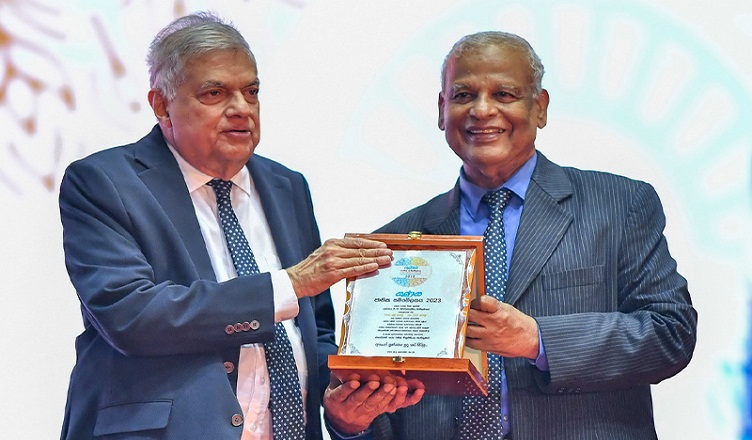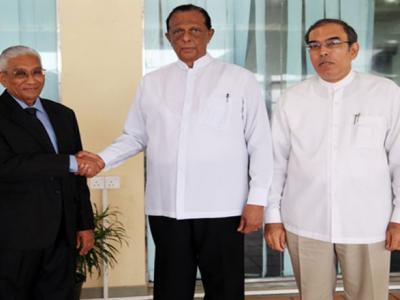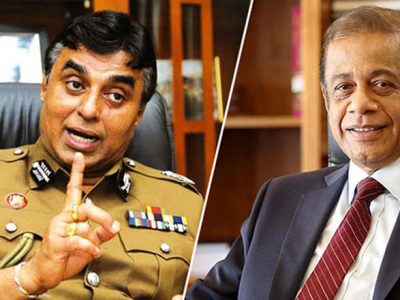(LANKAPUVATH | COLOMBO) – President Ranil Wickremesinghe emphasized that, despite the country’s progress from past challenges, the journey is not yet complete. He stated that in order to achieve the desired goals, everyone must move forward with great patience.
The President also highlighted that the current government will consistently adhere to the “Principles and Basic Duties of State Policy Management” outlined in Chapter 06 of the Constitution, rather than pursuing political policies.
These remarks were made during his address at the Sanasa National Convention 2023 held at the Sugathadasa Indoor Stadium in Colombo today (28).
The three-year plan for the national program aimed at developing 5,000 villages through the advancement of 1,250 Sanasa societies, based on the concept of Dr. P.A. Kirivandeniya, was unveiled. Dr. Kirivandeniya presented this comprehensive plan to President Ranil Wickremesinghe. Additionally, a special commemorative plaque was presented to the President in recognition of this initiative.
Furthermore, plans were outlined for 5,000 Sanasa leaders across 25 districts. Through this initiative, the goal is to initiate 10,000 development projects in 5,000 villages, thereby creating 50,000 direct or indirect job opportunities nationwide.
This program is anticipated to strengthen the economy of more than 300,000 families.
President Ranil Wickremesinghe, in his address, highlighted that the contribution of businesses like Sanasa will significantly aid the government’s efforts to build the country’s economy. The President also called upon both the public and private sectors to actively participate in the government’s program, working collaboratively towards building a prosperous nation and enhancing the lives of the people.
President Ranil Wickremesinghe, offering additional remarks, expressed gratitude to Dr. Kirivandeniya for initiating and advancing the Sanasa movement, which has evolved into a highly successful project. He emphasized the importance of further developing this business.
In the context of building the country’s economy, President Wickremesinghe underscored the need to progress by incorporating businesses like Sanasa.
Looking ahead, President Wickremesinghe shared that the government is anticipating the declaration by the International Monetary Fund (IMF) before the end of December, affirming the country’s achievement of debt-controlling stability. However, he emphasized that obtaining this certification alone does not resolve all challenges. The government aims to secure concessional interest to manage and settle existing debt. Following this, there is recognition of the necessity to take new loans to support on-going economic initiatives.
In order to accomplish these tasks, it is imperative to cultivate a robust economy in the country, with a particular emphasis on the export economy. The active participation of the Sanasa movement is deemed a substantial contribution to this endeavour.
Since assuming government responsibilities, our approach has consistently veered away from political policies. Instead, we have steadfastly adhered to the principles and fundamental duties outlined in Chapter 06 of the Constitution.
The shared objective of both the Sanasa movement and the government is the rapid development of the entire country through collaborative economic endeavours in both the public and private sectors. This strategic direction is crucial for breaking free from the prevailing debt trap, necessitating a concerted effort toward rapid development.
The aspiration is to ensure an adequate standard of living for everyone, particularly in the aftermath of the economic collapse that impacted numerous individuals, leading to job losses and business closures. During that challenging period, people faced considerable hardships.
As the country experiences economic revitalization, with the initiation of agricultural projects and a thriving tourism industry, there is a resurgence of job opportunities, particularly within the tourism sector. The call is for collective efforts in developing these fields collaboratively.
Furthermore, the commitment extends to working towards providing a satisfactory standard of living for every citizen and their families. This collective journey requires great patience, acknowledging the progress made from the challenges faced. While the journey is on-going, the focus for the coming years, starting from January, is to continue this trajectory of development.
Our country once held the status of a middle-class income nation. However, we have regressed to a low-income status. The current endeavour is to regain the classification of a lower-middle-class income country. Subsequently, the aim is to progress to a nation with upper-middle-class incomes, ultimately aspiring to achieve the status of a high-income country. Plans have been meticulously laid out until 2048 to realize these ambitions. Accordingly, by 2030, the immediate focus is on becoming a lower-middle-class income country.
Recognizing the limited educational opportunities in our country and the tendency for individuals to seek higher education abroad, plans have been devised to reorganize the education sector. This includes the implementation of a program by 2030 to introduce English into schools and higher education, along with a comprehensive reform of vocational education starting this year.
Additionally, the commencement of the agriculture modernization program presents a substantial opportunity for organizations like Sanasa to contribute. The call is extended to everyone to collaborate in these activities.
Dr. P. A. Kirivandeniya, the founder of Sanasa, highlighted the focus on growing the country’s rural economy through the integration of new technology. Despite the setbacks, including the challenges posed by the COVID epidemic, activities that have slowed down in recent years is set to restart. The three-year plan presented, aims to achieve targeted goals within the next three to ten years, primarily focusing on engaging the rural youth community in the country’s development. Awareness programs, including classes and seminars, have been initiated at the rural level to foster a way of life that aligns with their income, with the overarching theme of “Let’s reduce expenses – Let’s increase incomes.”
Distinguished attendees at this event included former President Maithripala Sirisena, former Speaker Chamal Rajapaksa, Deputy Speaker Ajith Rajapaksa, Sabaragamu Province Governor Navin Dissanayake, and other leaders and members of Sanasa representing all provinces of the island.




